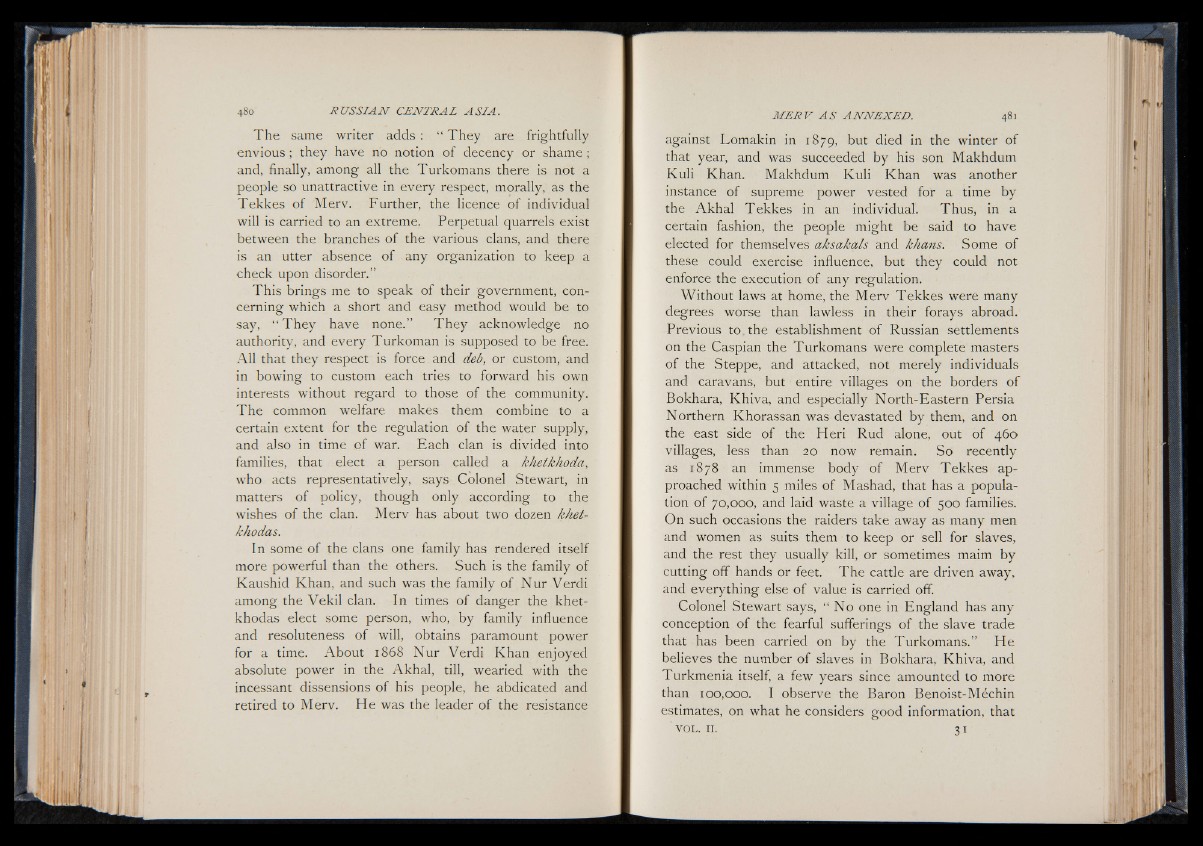
The same writer adds : “ They are frightfully
envious ; they have no notion of decency or shame ;
and, finally, among all the Turkomans there is not a
people so unattractive in every respect, morally, as the
Tekkes of Merv. Further, the licence of individual
will is carried to an extreme. Perpetual quarrels exist
between the branches of the various clans, and there
is an utter absence of any organization to keep a
check upon disorder.”
This brings me to speak of their government, concerning
which a short and easy method would be to
say, “ T h e y have none.” T hey acknowledge no
authority, and every Turkoman is supposed to be free.
All that they respect is force and deb, or custom, and
in bowing to custom each tries to forward his own
interests without regard to those of the community.
The common welfare makes them combine to a
certain extent for the regulation of the water supply,
and also in time of war. Each clan is divided into
families, that elect a person called a khetkhoda,
who acts representatively, says Colonel Stewart, in
matters of policy, though only according to the
wishes of the clan. Merv has about two dozen khet-
kkodas.
In some of the clans one family has rendered itself
more powerful than the others. Such is the family of
Kaushid Khan, and such was the family of Nur Verdi
among the Vekil clan. In times of danger the khet-
khodas elect some person, who, by family influence
and resoluteness of will, obtains paramount power
for a time. About 1868 Nur Verdi Khan enjoyed
absolute power in the Akhal, till, wearied with the
incessant dissensions of his people, he abdicated and
retired to Merv. He was the leader of the resistance
against Lomakin in 1879, but died in the winter of
that yeaq and was succeeded by his son Makhdum
Kuli Khan. Makhdum Kuli Khan was another
instance of supreme power vested for a time by
the Akhal Tekkes in an individual. Thus, in a
certain fashion, the people might be said to have
elected for themselves aksakals and khans. Some of
these could exercise influence, but they could not
enforce the execution of any regulation.
Without laws at home, the Merv Tekkes were many
degrees worse than lawless in their forays abroad.
Previous to. the establishment of Russian settlements
on the Caspian the Turkomans were complete masters
of the Steppe, and attacked, not merely individuals
and caravans, but entire villages on the borders o f
Bokhara, Khiva, and especially North-Eastern Persia
Northern Khorassan was devastated by them, and on
the east side of the Heri Rud alone, out of 460
villages, less than 20 now remain. So recently
as 1878 an immense body of Merv Tekkes approached
within 5 miles of Mashad, that has a population
of 70,000, and laid waste a village of 500 families.
On such occasions the raiders take away as many men
and women as suits them to keep or sell for slaves,
and the rest they usually kill, or sometimes maim by
cutting off hands or feet. The cattle are driven away,
and everything else of value is carried off.
Colonel Stewart says, “ No one in England has any
conception of the fearful sufferings of the slave trade
that has been carried on by the Turkomans.” He
believes the number of slaves in Bokhara, Khiva, and
Turkmenia itself, a few years since amounted to more
than 100,000. I observe the Baron Benoist-Mdchin
estimates, on what he considers good information, that
v o l . 11. 31